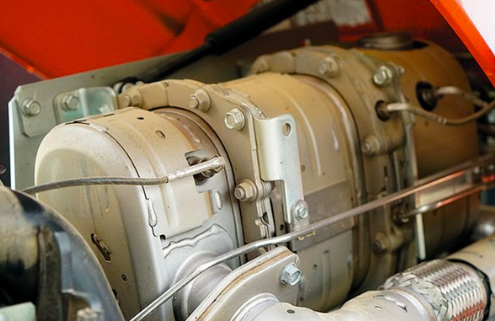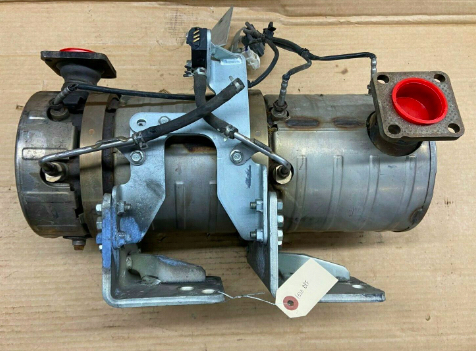Kubota DPF Problems can be daunting, but with the proper knowledge and understanding, they can be quickly and effectively resolved. Understanding the cause of the issue is the first step to finding an appropriate solution, and learning the necessary maintenance and repair techniques can ensure your Kubota diesel engine operates smoothly and efficiently.
📢Read also: Kubota Zg23 Common Problems
Resolving Kubota DPF Problems with Confidence Kubota DPF Problems

Diesel Particulate Filters (DPF) are essential components of the Kubota diesel engine that help reduce emissions. However, they can cause problems if not regularly maintained. To resolve Kubota DPF Problems confidently, it's essential to understand the causes of the issue, the maintenance and repair techniques required, and how to prevent them in the future. This guide will provide an overview of Kubota DPF Problems, their causes, and the steps you can take to resolve them and ensure efficient engine operation.
| Steps | Description |
|---|---|
| 1. Identify the Causes | Find out what is causing the Kubota DPF problems by inspecting and troubleshooting the engine. |
| 2. Perform Maintenance Tasks | Follow the recommended maintenance tasks, such as cleaning the filter and replacing fuel filters, to ensure your engine runs at its best. |
| 3. Carry Out Repairs | Carry out repairs to faulty parts, such as replacing faulty sensors, to restore the engine's performance. |
| 4. Follow Prevention Protocols | Following preventive protocols, such as avoiding prolonged idling and using the right fuel, can help prevent Kubota DPF problems from recurring. |
Fuel Pressure
Fuel pressure is an essential factor to consider when troubleshooting Kubota DPF problems. Low fuel pressure can result in poor combustion and reduced engine performance, leading to reduced fuel economy and increased emissions. If the fuel pressure is too low, the fuel injection system can become clogged, resulting in further issues. To ensure optimal engine performance, the fuel pressure should be checked regularly, and any problems should be addressed promptly.
Clogged Injectors
Clogged injectors can cause various Kubota DPF problems, including reduced engine performance and increased emissions. Clogging is usually caused by the accumulation of dirt and debris, which can be caused by poor fuel quality, a lack of maintenance, or even a faulty injector. To prevent and address clogged injectors, it is essential to use high-quality fuel, properly maintain the fuel system, and replace any faulty injectors.
Faulty Sensors
Faulty sensors can cause Kubota DPF problems, such as reduced engine performance and increased emissions. Faulty sensors can be caused by various issues, such as loose connections, faulty wiring, or even a damaged sensor. To prevent and address this issue, the sensor wiring should be checked regularly, and any faulty connections should be handled promptly. Additionally, any damaged or faulty sensors should be replaced immediately.
Faulty EGR System
Finally, a faulty EGR (Exhaust Gas Recirculation) system can cause Kubota DPF problems. The EGR system recirculates some exhaust gases into the engine to improve combustion and reduce emissions. A faulty EGR system can cause excessive exhaust gases to enter the combustion chamber, leading to poor engine performance and increased emissions. To prevent and address this issue, the EGR system should be inspected regularly, and any faulty components should be replaced as soon as possible.
The keyword "Kubota DPF Problems" can cause various issues for diesel engine owners, including reduced engine performance, increased emissions, and clogged injectors. By understanding the possible causes of these problems, such as low fuel pressure, clogged injectors, faulty sensors, and a faulty EGR system, diesel engine owners can take the necessary steps to prevent and address these issues. Owners can ensure their Kubota diesel engine operates smoothly and efficiently by regularly inspecting the fuel system, replacing defective components, and using high-quality fuel.
🎯Suggested article: Kubota G2160 Problems
Key Takeaways for Resolving Kubota DPF Problems
- Identify the root cause of Kubota DPF problems by inspecting and troubleshooting the engine.
- Perform regular maintenance tasks, such as cleaning the filter and replacing fuel filters, to ensure optimal engine performance.
- Carry out repairs to faulty parts, such as replacing faulty sensors, to restore the engine's performance.
- Follow preventive protocols, such as avoiding prolonged idling and using the right fuel, to prevent Kubota DPF problems from recurring.
- Check fuel pressure regularly and address any issues promptly.
- Use high-quality fuel, properly maintain the fuel system, and replace faulty injectors to prevent clogged ones.
- Inspect sensor wiring regularly and address any faulty connections promptly.
- Inspect the EGR system regularly and replace any faulty components immediately.
In conclusion, understanding the various causes of Kubota DPF problems is essential to resolving them. By taking the necessary steps, such as inspecting and troubleshooting the engine, performing regular maintenance tasks, and carrying out repairs to any faulty parts, diesel engine owners can ensure their engine performs optimally and efficiently. Additionally, following preventive protocols and using high-quality fuel can help to prevent Kubota DPF problems from recurring. By following these steps, diesel engine owners can confidently enjoy the performance and efficiency of their Kubota diesel engine.
⚡️Another article: Kubota Zg222 Problems
Achieving Optimal Engine Performance with Kubota DPF Solutions
To ensure optimal engine performance and efficiency, diesel engine owners should take the necessary steps to prevent and address Kubota DPF problems. By understanding the possible causes of these issues, such as low fuel pressure, clogged injectors, faulty sensors, and a faulty EGR system, diesel engine owners can take the necessary steps to ensure their engine runs smoothly and efficiently.
